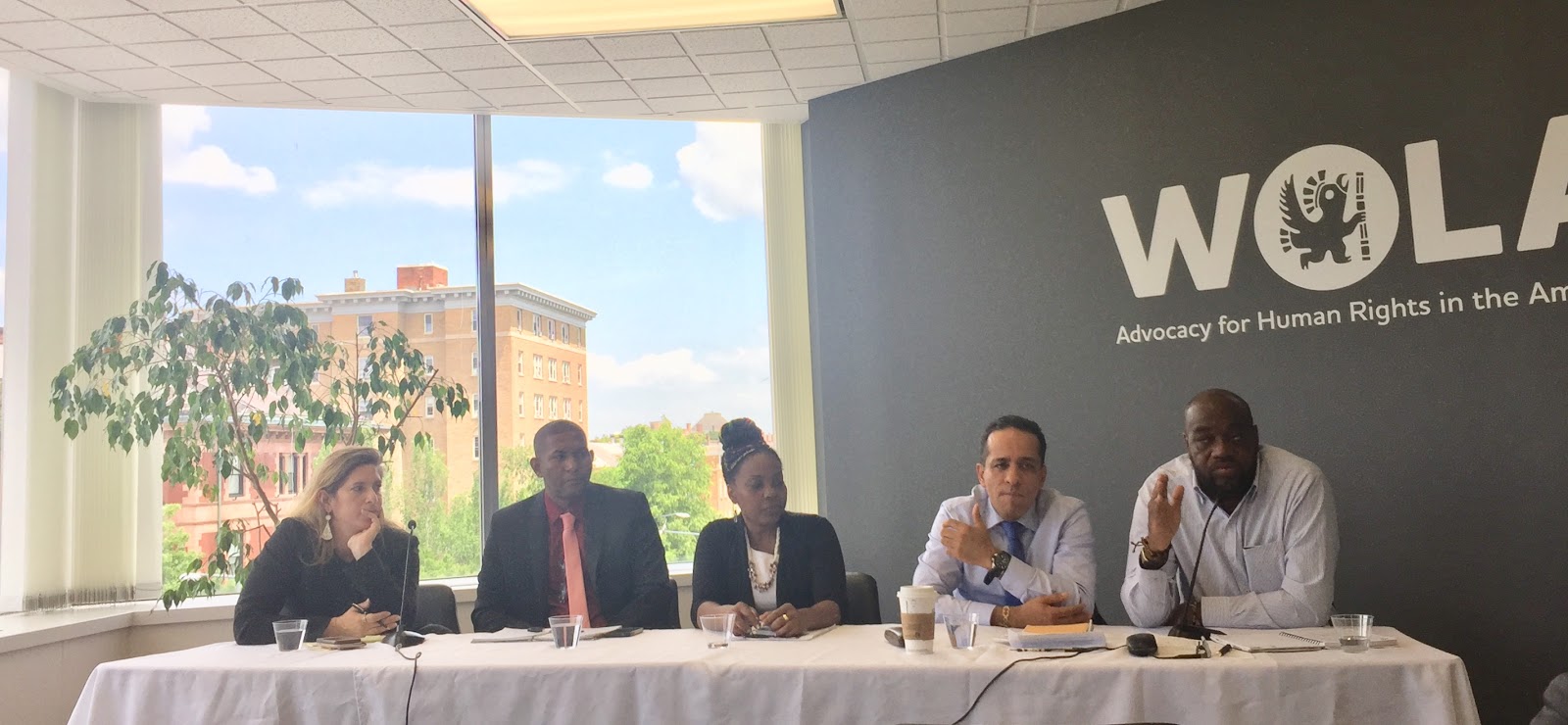Date: Jun 27, 2018
Author: Robert Carlson
The Washington Office on Latin America (WOLA) welcomed in May a delegation of Colombian labor leaders to Washington to discuss last year’s strike in Buenaventura. At a public event, Colombian Senator Alexander López Maya and three members of the Buenaventura Civil Strike Committee talked about their experiences and commented on the state of labor, civil, and human rights after the strike. I will focus on two of the speakers: Senator Alexander López Maya and María Miyela Riascos.
 Left to right: Gimena Sánchez (WOLA), Henry Tobar, María Miyela Riascos, Senator Alexander López Maya, and Victor Vidal
Left to right: Gimena Sánchez (WOLA), Henry Tobar, María Miyela Riascos, Senator Alexander López Maya, and Victor Vidal
Senator Alexander López Maya
“What we are saying today, to the U.S. government and to the U.S. Congress, is that for any decision that is taken, the people have to be consulted. … 78% of the territory of Buenaventura belongs to the people, period.”
Senator López Maya emphasized that state presence in Buenaventura not only continually fails to respect community land rights, but also prioritizes development over people: “The armed forces are in Buenaventura, but they’re concentrated here only to protect development of ports, not to guarantee security for people.”
“We ask for solidarity, not only from governments … but also from the international community, for the people of Buenaventura, so that they don’t keep being killed, so that they don’t keep being displaced, and so that the agreement that was signed with the national government is fulfilled in a comprehensive way.”
López Maya has represented the Valle del Cauca Department in the Colombian Senate since 2006. During that time he has been an outspoken advocate of labor rights and the Afro-Colombian community. He has faced violent backlash for his activism, however. Just two weeks before his trip to D.C., a group of gunmen fired on his vehicle in Cali. Fortunately, the senator was unharmed, but the event underscores the reality that advocating for human rights remains a dangerous business in Colombia.
María Miyela Riascos
“For us, territory is life. Life isn’t possible without territory.”
“Because we are in a territory where we have natural resources—where we have oil, where we have gold, where we have a diversity of plants that could be an important research opportunity for Colombia and the world—they kill us, they throw us out, [and] they displace us.” For Riascos, forced displacement had a personal significance. At 17, she was forced to leave her home when armed groups threatened her community in Buenaventura.
“We have come to understand that as defenders of human rights, we can find an alliance with you, because now in Buenaventura we need help from the world. Today, we are at immediate risk.”
Riascos is a member of the Buenaventura Civil Strike Committee. The committee formed in May 2017, when a coalition of 20 civil society groups came together to protest harsh conditions and lack of access to government services. Leaders like Riascos coordinated a 22-day workers’ strike in Colombia’s largest Pacific port city, eventually negotiating an agreement with the federal government to fund its commitments to the people of Buenaventura. Yet, a year after the settlement,much work remains to ensure that the government honors its obligations and respects the rights of the community.

